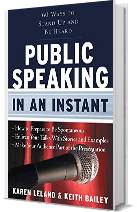
Take Your Brand to The Next Level.
A Branding Agency Helping CEOs and Companies Increase Their Personal and Business Reach, Reputation, and Bottom Line.


I am interested in:
We help CEOs, executives, authors & entrepreneurs dramatically turn up the volume on their personal brands.
Contemplating a company rebrand? Partner with us to fortify your brand’s future relevance and enduring impact.
Our personalized Leadership Executive Coaching Process is meticulously crafted for high-performing leaders who want to unlock unexpected results in themselves and those around them.

Work with Karen Tiber Leland & Sterling Marketing Group

- Rent My Brain Session
- Brand Consulting
- Webinars & Keynotes
- “Done For You” Services
- Off-Sites
- Fractional CMO
We partner with clients across the globe to build stronger personal and business brands.
View More Clients
Case Studies
Apple
Conducted a series of talks/workshops sponsored by Apple for small businesses across the US on building a competitive brand.
![]() I am searching for adjectives that describe your presentation. Words like professional, experienced, sensational, stimulating, dynamic and inspiring come to mind.
I am searching for adjectives that describe your presentation. Words like professional, experienced, sensational, stimulating, dynamic and inspiring come to mind.
Coors
Facilitated a two-day executive team retreat to create a brand strategy and achieve buy in from all participants.
![]()
![]()
![]()
![]()
![]()
![]()
![]()
![]()
![]()
![]()
Orlando Magic
Led a one-day brand strategy session to address and solve priority issues.
![]()
![]()
![]()
![]()
![]()
![]()
![]()
![]()
![]()
![]()
YPO
Led a series of webinars and live workshops for Forums and groups around the world on creating a CEO brand.
![]()
![]()
![]()
![]()
![]()
![]()
![]()
![]()
![]()
![]()
Hoffman Institute
Ongoing consulting for brand strategy, ideation and implementation.
![]()
![]()
![]()
![]()
![]()
![]()
![]()
![]()
![]()
![]()
Taming Your Alpha Bitch
Implemented a blogger outreach program to help promote the client’s book to NYT best seller status.Worked as a fractional CMO to create new award-winning website, significant media placement (New York Times, CNN etc.) and increase social media following and engagement by more than 1000%.
![]()
![]()
![]()
![]()
![]()
![]()
![]()
![]()
![]()
![]()
Yoga with Weights for Dummies
Worked with the author to write a top-notch book proposal that resulted in the book being sold to a top ten publisher.
![]()
![]()
![]()
![]()
![]()
![]()
![]()
![]()
![]()
![]()
Fedx Kinkos
Gave a keynote speech at conference on the power of personal branding.
![]()
![]()
![]()
![]()
![]()
![]()
![]()
![]()
![]()
![]()
Bank of America
Led Brand Ambassador© training for groups of leaders across the United States.
![]()
![]()
![]()
![]()
![]()
![]()
![]()
![]()
![]()
![]()
View More Case Studies


Take the Quiz
Where Does Your Brand Stand?
This simple nine-question quiz will help you easily determine what phase your personal or business brand is in and how to move it to the next level.
What Clients Say About Us
Read More Testimonials
Check out some of my books






















